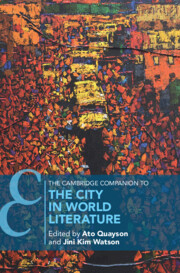Book contents
- The Cambridge Companion to the City in World Literature
- The Cambridge Companion to the City in World Literature
- Copyright page
- Contents
- Contributors
- Chronology of Political, Literary, and Cultural Events
- Chapter 1 Introduction
- Part I Critical Approaches
- Part II Spotlight Literary Cities
- Chapter 5 The Neighborhood and the Sweatshop
- Chapter 6 “The Whole World in Little”
- Chapter 7 Unworlding Paris
- Chapter 8 Sketching the City with Words
- Chapter 9 Romance and Liminal Space in the Twentieth-Century Cairo Novel
- Chapter 10 Bombay/Mumbai and its Multilingual Literary Pathways to the World
- Chapter 11 At Home in the World
- Chapter 12 Imagining the Migrant in Twenty-First Century Johannesburg
- Chapter 13 Russia
- Chapter 14 “Cityful Passing Away”
- Chapter 15 From Altepetl to Megacity
- Chapter 16 (In)Visible Beijing Within and Without World Literature
- Chapter 17 Worlding Lagos in the Long Twentieth Century
- Chapter 18 Haunted Vitality
- Select Bibliography
- Index
- Cambridge Companions To …
Chapter 11 - At Home in the World
Singapore’s Literary Translocality
from Part II - Spotlight Literary Cities
Published online by Cambridge University Press: 13 July 2023
- The Cambridge Companion to the City in World Literature
- The Cambridge Companion to the City in World Literature
- Copyright page
- Contents
- Contributors
- Chronology of Political, Literary, and Cultural Events
- Chapter 1 Introduction
- Part I Critical Approaches
- Part II Spotlight Literary Cities
- Chapter 5 The Neighborhood and the Sweatshop
- Chapter 6 “The Whole World in Little”
- Chapter 7 Unworlding Paris
- Chapter 8 Sketching the City with Words
- Chapter 9 Romance and Liminal Space in the Twentieth-Century Cairo Novel
- Chapter 10 Bombay/Mumbai and its Multilingual Literary Pathways to the World
- Chapter 11 At Home in the World
- Chapter 12 Imagining the Migrant in Twenty-First Century Johannesburg
- Chapter 13 Russia
- Chapter 14 “Cityful Passing Away”
- Chapter 15 From Altepetl to Megacity
- Chapter 16 (In)Visible Beijing Within and Without World Literature
- Chapter 17 Worlding Lagos in the Long Twentieth Century
- Chapter 18 Haunted Vitality
- Select Bibliography
- Index
- Cambridge Companions To …
Summary
Port cities on the island of Singapore from the fourteenth century onwards have produced a dichotomy in literary representation. On the one hand, the city is monumental, its expanding physical infrastructure subsumed within solid historical developmental narratives in which dystopian and utopian visions of governance co-exist. On the other, the port offers the possibility of fluidity, an opening to the flows of peoples, culture, and trade. As a site of writing in many languages, Singapore exemplifies the concerns of world literature: interlinguistic practices, migration, networks of publishing and audiences in which the global continually returns.This chapter uses the concept of translocality to enable two intellectual moves. First, it moves us beyond a binarism between city and port, structure and fluidity in Singapore literary studies, in which literary texts are always seen as promoting fluidity as a critique of structure, rather than as acts of building, self-making and development. Second, the translocal experience of Singapore may offer a heuristic for the study of world literature, in which dystopian accounts of the imbrication of markets, reading publics, prizes, and creative writing programs with neoliberalism are often countered through utopian close readings of the transcendent possibilities of individual literary texts.
- Type
- Chapter
- Information
- The Cambridge Companion to the City in World Literature , pp. 165 - 182Publisher: Cambridge University PressPrint publication year: 2023



